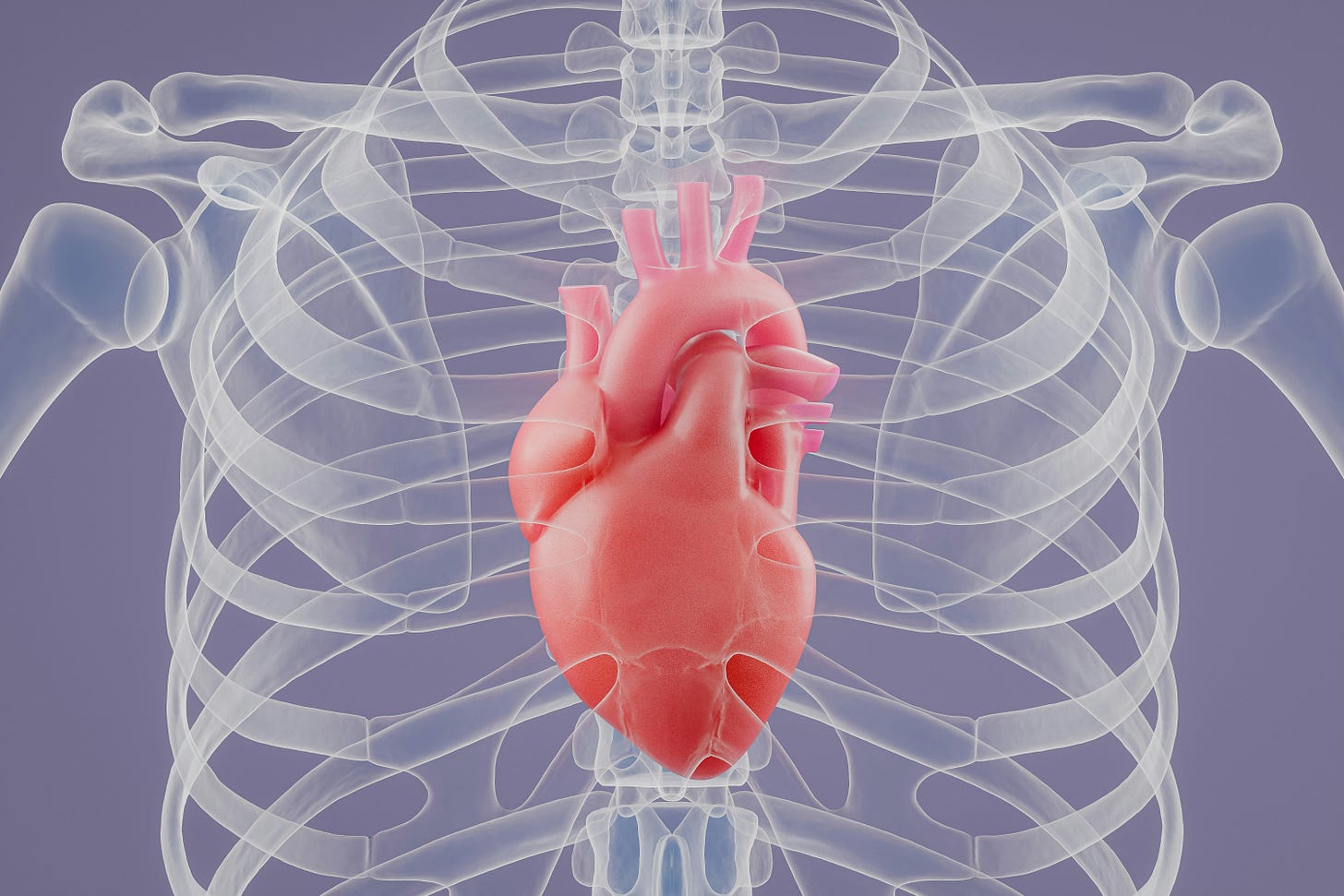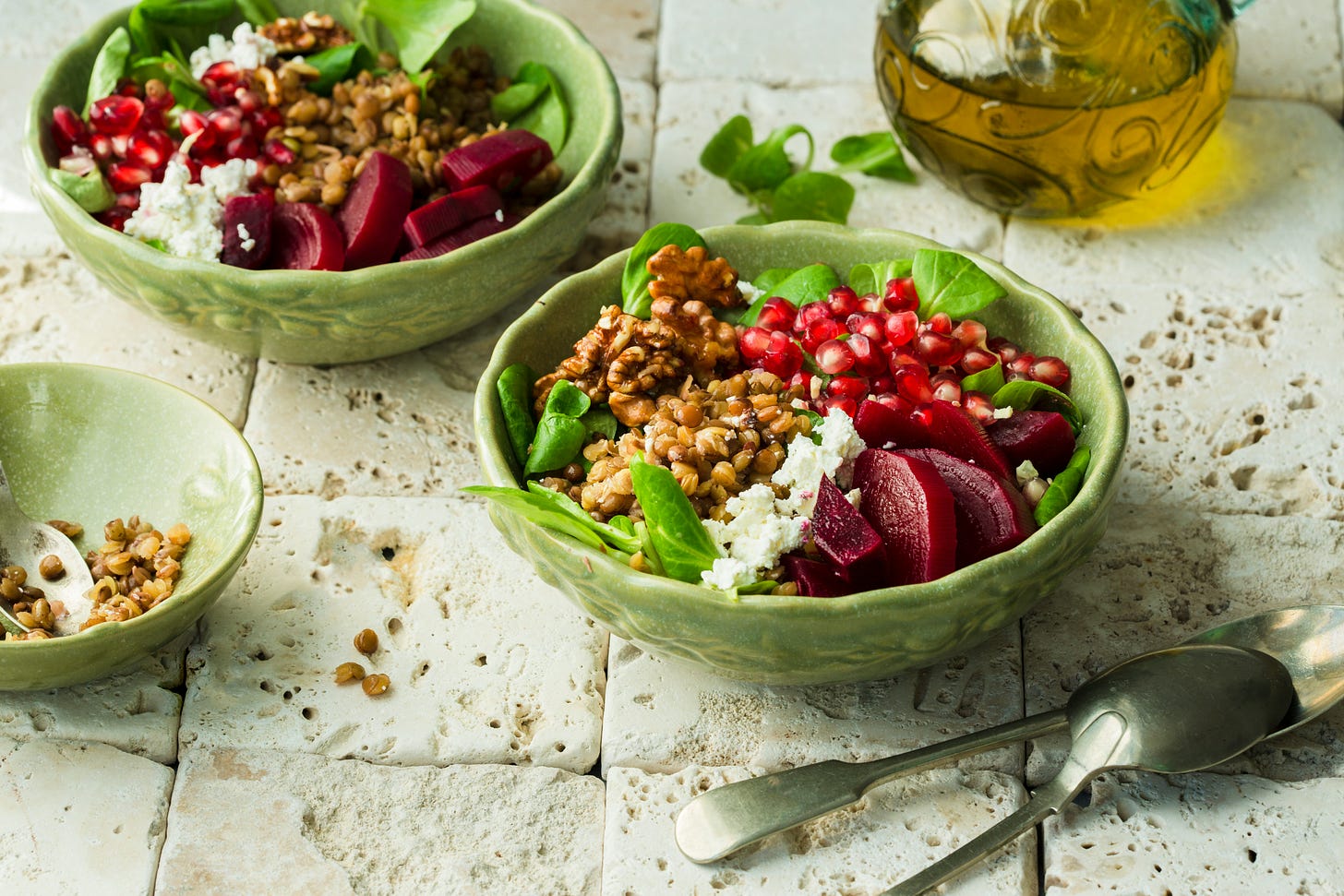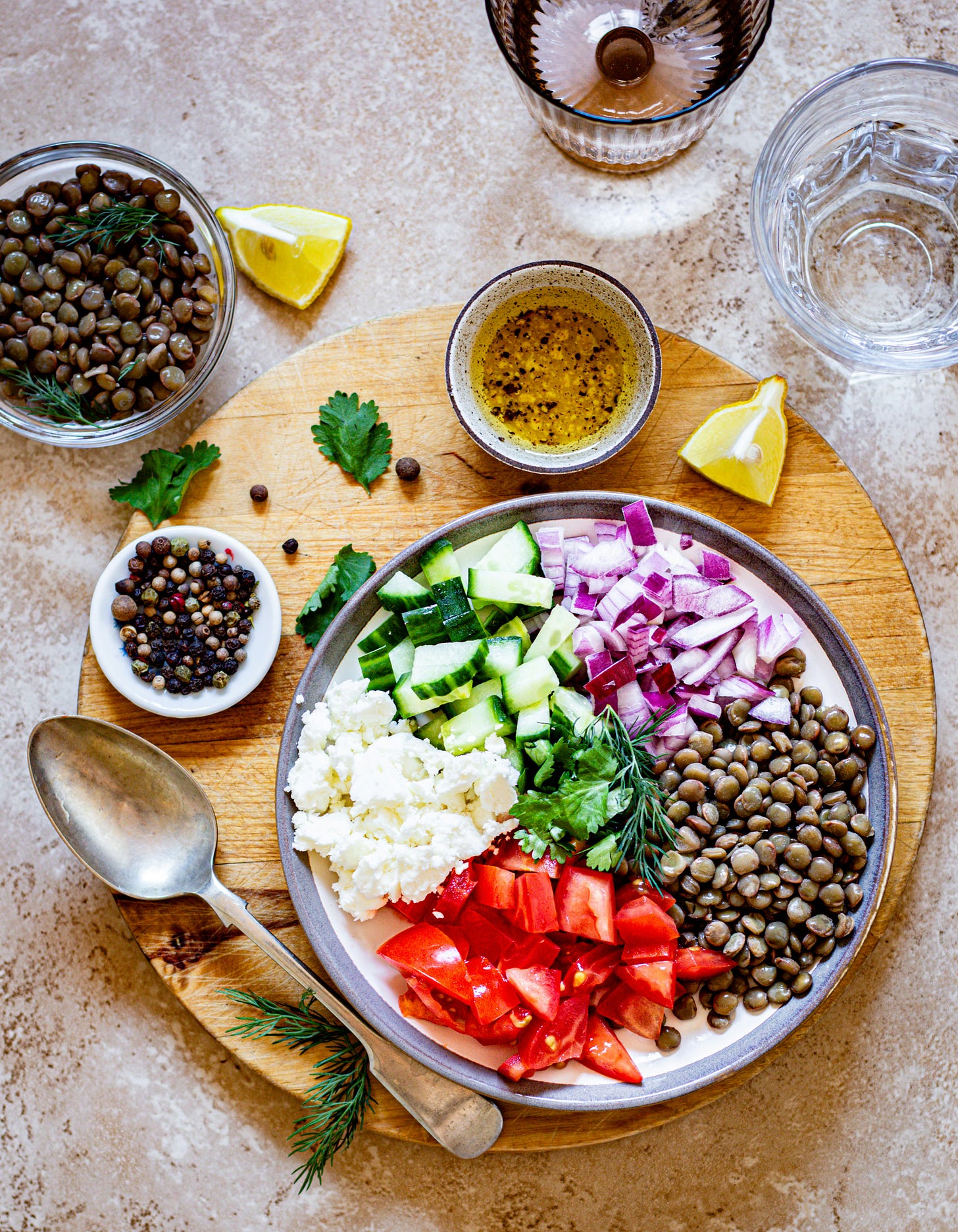It's Time You Learned About Insulin Resistance
What it is, why it matters, and how to spot it early.
You’ve probably heard the term ‘insulin resistance’ thrown around, but have you ever really stopped to think about what it means and why it’s important?
If you’re serious about your long-term health, insulin resistance is something you need to pay attention to.
It’s more common than you might think, and it has a bigger impact on your health than you realise!
I remember first learning about this when I studied nutrition, and my mind was kind of blown!
It’s kind of ironic that I’m hitting send on this post having just had a week of breakfasts of french toast and pain au chocolat in France, but we move.
And to be fair, I did always tend to start the breakfast with some scrambled eggs, devilled eggs (B2B eggs, what a life), spinach and the occasional beef sausage. I’ll explain more about why I did this later in the post.
What Is Insulin Resistance, Anyway?
Essentially, insulin resistance means your body isn’t responding to insulin as it should.
Insulin is a hormone that helps your cells absorb glucose (sugar) from the blood for energy. But when you develop insulin resistance, your cells become less responsive to insulin. As a result, your pancreas tries to compensate by producing more insulin, which leads to higher levels of insulin in your blood.
While it can feel sudden, insulin resistance usually develops gradually beneath the surface, often as a result of nutrition and lifestyle habits - many of which you can influence with small, consistent changes.
Why Should You Care About Insulin Resistance?
Insulin resistance isn’t just about blood sugar. It can affect your energy, hormones and long-term health. Here’s why it matters.
1. It Can Lead to Metabolic Syndrome
Metabolic syndrome is a combination of conditions like high blood pressure, elevated blood sugar and excess abdominal fat - particularly visceral fat (the fat around your internal organs), which increases your risk of heart disease and stroke. Insulin resistance is at the heart of metabolic syndrome.
When these conditions occur together, they create a vicious cycle where each issue worsens the others. Brill.
For example, high blood sugar can increase fat storage, especially around the middle, while excess abdominal fat can worsen insulin resistance, making it harder to manage blood sugar.
Because insulin resistance is influenced by many factors, it’s tough to reverse without addressing them together – not just food, but also stress, sleep, and activity levels.
2. Type 2 Diabetes Is a Real Risk
If insulin resistance goes unchecked, it can develop into type 2 diabetes.
However, with small changes, insulin resistance can often be reversed, helping you reduce the risk of developing diabetes - and in some cases, even supporting remission.
3. It’s a Major Contributor to Heart Disease
Even outside of full-blown metabolic syndrome, insulin resistance can raise inflammation, disrupt lipid levels, and contribute to artery damage – all of which increase your chances of developing cardiovascular disease.
4. It Can Affect Your Liver
Insulin resistance can also lead to fatty liver disease, a condition where fat builds up in the liver, even if you don’t drink alcohol. Over time, this can cause liver damage and increase your risk of developing serious liver conditions.
5. Impact on Weight Management
Insulin resistance can make it harder to maintain or lose weight, particularly around the belly.
When your body doesn’t respond well to insulin, it often produces more of it. Chronically high insulin levels are linked to increased fat storage, particularly in the abdominal area.
Insulin resistance can slow down the process of fat loss, making it feel like your efforts aren’t paying off. Very frustrating.
6. Day-to-Day Wellbeing
Insulin resistance can leave you feeling suboptimal day to day!
Higher insulin levels and fluctuating blood sugar can contribute to fatigue, brain fog and mood swings. You may notice that you feel tired even after a good night’s sleep or that your energy levels are inconsistent throughout the day.
7. Insulin Resistance and Skin Health
Did you know that insulin resistance can also impact your skin...? I’m going to do a post on blood sugar and skin health soon, as it’s so important - and so interesting!
Elevated insulin levels are linked to a variety of skin issues, including -
Acne - insulin resistance can lead to higher levels of androgens (hormones that stimulate oil production in the skin), which can contribute to acne.
Skin Ageing - insulin resistance can speed up skin ageing by contributing to the breakdown of collagen and elastin. It also increases the formation of advanced glycation end products (AGEs) – compounds that damage skin structure and lead to wrinkles and loss of firmness over time.
What You Can Do to Improve Insulin Sensitivity
By making a few simple changes to your diet and lifestyle, you can start improving insulin sensitivity and reducing your risk of all of these health concerns.
Eat More Whole, Unprocessed Foods
As a rule of thumb, focus on fresh vegetables, some fruit (especially low-glycaemic fruits like berries or apples), whole grains and lean proteins.
Be Strategic About Protein and Meal Order
Remember my French breakfasts of pain au chocolat and French toast? I always made sure to start with eggs, spinach and the occasional beef sausage – and here’s why.
The order in which you eat your food actually matters. Starting your meal with protein, fibre, or fat (think eggs, greens, nuts, yoghurt) can blunt the blood sugar spike from the carbohydrates that follow. It’s a simple shift, but it can make a noticeable difference to your energy and insulin response.
And beyond meal order, getting enough protein overall is key. It helps to build and preserve muscle, keeps you fuller for longer, and supports better blood sugar control – all of which can improve insulin sensitivity over time.
Increase Your Fibre Intake
Fibre - especially soluble fibre, helps to slow down the absorption of sugar in the bloodstream, which helps to reduce insulin spikes.Foods like beans, lentils, oats and sweet potatoes are excellent sources of fibre that will keep your blood sugar levels stable and improve your insulin sensitivity.
Incorporate More Omega-3 Fatty Acids
Omega-3 fatty acids, found in oily fish like salmon, sardines, and mackerel, have anti-inflammatory properties that can help to reduce insulin resistance. I think I’ll do a post on this soon, as its so interesting.They also support heart health, making them a win-win for managing your metabolic health.
Apple Cider Vinegar Before Meals
Apple cider vinegar has been shown in small studies to help lower post-meal blood sugar levels and improve insulin sensitivity when taken before carbohydrate-rich meals. It’s not a magic fix, but it can be a helpful addition alongside other habits.
Prioritise Magnesium-Rich Foods
Magnesium plays a crucial role in blood sugar regulation and insulin sensitivity. Many people are deficient in magnesium, but you can boost your intake with foods like leafy greens, nuts, seeds, whole grains, tofu, oily fish and chicken. Magnesium-rich foods help your body utilise insulin more effectively and support muscle function.Fermented Foods for Gut Health
A healthy gut microbiome is linked to better metabolic health. Fermented foods like kimchi, sauerkraut, kefir, and live yoghurt can help to promote a healthy gut, which in turn can improve insulin sensitivity. A well-balanced microbiome can help with inflammation and metabolism.
Move Your Body
Regular exercise, especially strength training and cardio, helps your muscles use insulin more effectively and improves your overall metabolic health.
Lose Belly Fat
Carrying excess weight, particularly around your abdomen, can worsen insulin resistance. However, it’s important to note that you can’t target fat loss in just one area (wouldn’t that be nice!) - weight loss happens across your body as a whole. Reducing overall body fat, especially abdominal fat, can improve your insulin sensitivity.
Manage Stress
High stress can spike insulin levels and worsen insulin resistance. Incorporating stress-relief techniques like yoga, meditation, or even simple breathing exercises (Youtube is your friend here) can have a big impact on your health.
Prioritise Sleep
Poor sleep can make insulin resistance worse. Aim for 7–9 hours of restful sleep every night to support your body’s ability to regulate blood sugar.
How to Know If You’re Insulin Resistant
So, how do you know if you’re insulin resistant? The good news is that there’s a few ways to find out, including -
Signs and Symptoms
Common signs of insulin resistance include fatigue, increased hunger, difficulty losing weight (especially around your midsection), and dark patches of skin in areas like the neck or armpits (called acanthosis nigricans). If you notice any of these symptoms, it might be worth discussing with a healthcare provider.
Blood Tests
Your doctor can assess insulin resistance using several blood markers. These may include -Fasting blood glucose and insulin levels – Higher-than-normal levels can be an early sign of insulin resistance.
Haemoglobin A1c (HbA1c) – This test shows your average blood sugar over the past 2–3 months. Elevated levels can suggest insulin resistance or pre-diabetes.
Oral Glucose Tolerance Test (OGTT) – During this test, you’ll drink a sugary solution, and your blood sugar levels will be checked at intervals (typically 1 and 2 hours later). If your blood sugar remains high after two hours, it may indicate insulin resistance or pre-diabetes.
If you’re concerned about insulin resistance or want to know for sure, talk to your healthcare provider. Early detection and lifestyle changes can help to prevent or reverse the condition.
Basically - Don’t Ignore It
Insulin resistance is far more common than you think, and it’s something you have the power to change. If you want to avoid long-term health conditions like diabetes, heart disease and fatty liver disease - and also feel better day to day - it’s time to start paying attention to your insulin sensitivity.
The good news is, with small, consistent changes in your diet, exercise routine, sleep and stress management, you can make a huge difference in how your body responds to insulin.
What changes have you made to improve your insulin sensitivity? Let me know in the comments!
If this post helped you, you can -
→ Forward it to a friend who might need this info too
→ Leave a comment and let me know what surprised you most!
→ Or tap the ❤️ so I know you’re enjoying this kind of content (this also helps other people find this post, so you’d be doing both me and them a huge favour!)
I’m a 32-year-old nutritionist living in Lisbon, and I post twice weekly about nutrition and wellbeing. Subscribe and join in on the fun! You can expect a big backlog of work being uploaded over the next couple of weeks, as I was away a lot in June!
If you’re interested in exploring corporate nutrition talks or 1:1s for the company you work for, send an email to info@sophietrotmannutrition.com. That’s the main thing I do, and I work with 100s of global companies in this way.
And, let’s connect on Insta.
Have a lovely rest of your day.
Sophie xxx












So important to be sharing this great read! I was diagnosed with insulin resistance as a part of my formal re-diagnosis for PCOS and suddenly so many things made sense, its not easy but small tweaks every day slowly make a difference!
An informative read, thank you. Diet is key. A lack of understanding, often coupled with lazy decision-making, is turning our children into gremlins in the classroom, and placing a huge burden on our already-strained healthcare systems. Keep fighting the good fight 💪🏻